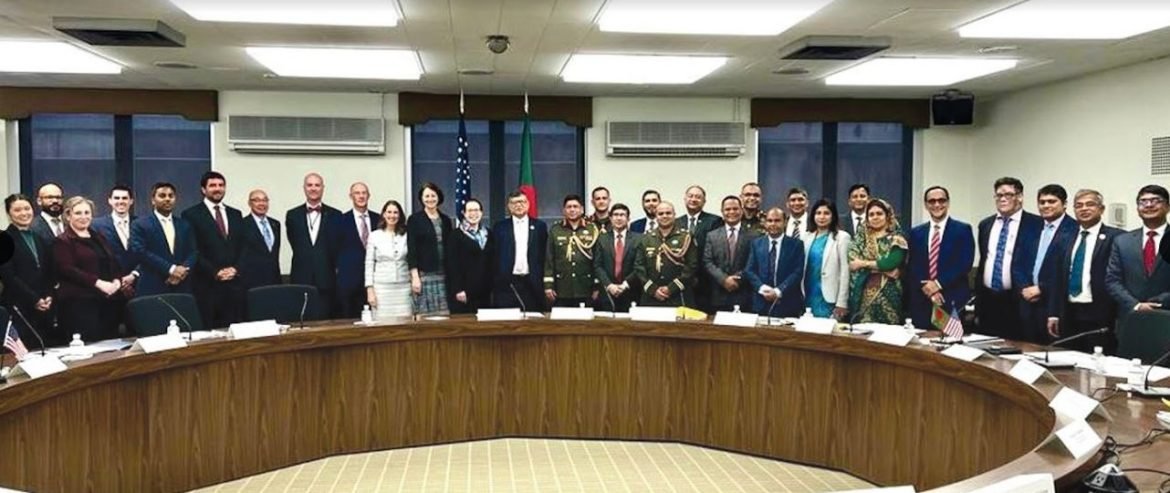Withdrawal of sanctions on RAB, Rohingya repatriation, boosting financial collaboration, reinstating GSP, enhancing security cooperation converging on the indo-pacific strategy, expatriation of the killer of Bangabandhu Rashed Chowdhury, focusing on the fair election process, addressing climate change and facilitating blue economy dominated the agenda during meetings between Bangladesh and the United States marking their 50th year of diplomatic relationship. With discussions over such key issues on such large scale brought some bilateral agreements for the betterment of both the countries and makes the tie between the countries stronger, writes SM TANJIL-UL-HAQUE
April 2022 has been a significant and progressive month in consideration to the bilateral relationships of Bangladesh and the United States as this month marks the 50th anniversary of Dhaka-Washington diplomatic ties. Diplomats from both the countries held meetings on several occasions to discuss various regional, bilateral and global issues which tends to envisage the Bangladesh-United States relations stronger than ever.
YOU CAN ALSO READ: GLOBAL FOOD SECURITY UPDATE: WHERE DOES BANGLADESH STAND?
On 4th April, a minister-level bilateral meeting was held marking the five decades of the establishment of Bangladesh-US diplomatic ties. Bangladesh raised a number of issues including enhancing trade and investment, withdrawing sanctions on the country’s elite force RAB, Rohingya repatriation and extraditing Bangabandhu’s killer Rashed Chowdhury, among other key topics during the meeting. From Bangladesh, lawmaker Mahbubul Alam Hanif, foreign secretary Masud Bin Momen, secretary (West) Shabbir Ahmad Chowdhury and Bangladesh’s Ambassador to the US M Shahidul Islam were also present at the meeting.
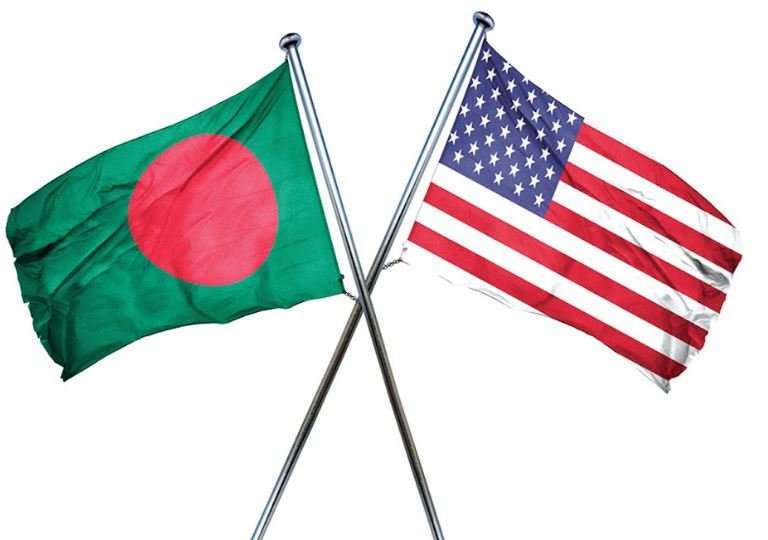
On 5th April, Foreign Minister Momen met US Senator Chuck Schumer (Democrat-New York), the Majority Leader of the US Senate. On the same day, Foreign Minister then attended a number of events organised by Washington-based think tanks including the United States Institute of Peace (USIP), the Centre for Strategic and International Studies (CSIS) and the National Bureau of Asian Research (NBR).
On the following day, FM Momen held meetings with US lawmakers including, Senator Jon Ossoff (Democrat-Georgia); and Congressman Ami Bera (Democrat-California). The meetings were held on 6th April in Washington DC at the respective offices of the Senators and the Congressman in US Capital.
The eighth round of security dialogue between Bangladesh and the United States has been held on 6th April at US Department of State to open-up areas for cooperation at the regional and global levels. Foreign Secretary Masud Bin Momen and US Under Secretary of State for Arms Control and International Security Bonnie Denise Jenkins led respective delegations in the dialogue.
Later, US Deputy Secretary of State Wendy Sherman had a meeting with Foreign Secretary Masud Bin Momen on 7th April and discussed bilateral economic, commercial and security collaboration.
A high-level Bangladeshi delegation meeting with US entrepreneurs also has been held on 7th April to boost US investment in Bangladesh.
Demanding Withdrawal of RAB Sanctions
Bangladesh urged the US side to withdraw the sanction imposed on Rapid Action Battalion (RAB) and on some of its current and former officials as this elite force played an important role in countering terrorism and preventing drug trafficking in Bangladesh.
Foreign Minister AK Abdul Momen urging the US side to withdraw the sanctions on RAB has said, “I told them that we have taken all the counteractive matters to address the issue of violating human rights.” FM also informed his US counterpart Antony Blinken that in last four months there was no killing by RAB.
FM said in the bilateral meeting, “RAB might sometimes have done some excesses but there is an in-built and strictly-followed system for accountability in the RAB, which tracks all allegations and the government previously took firm action against those who did wrong. I am very hopeful that the sanctions on RAB will be withdrawn.”
Dr Momen also informed US that there were major problems of militancy and terrorist activities in Bangladesh while a grenade attack on an Awami League rally killed 24 people and left more than 300 injured. “In such cases, RAB played a significant role to contain militancy and terrorism in the country,” Momen said, adding that the former US ambassador to Bangladesh James Moriarty had lauded the role of RAB and compared it with FBI of the United States. Here to mention, after the formation of RAB, the crime rate in Bangladesh gradually decreased due to the effective and swift action taken by RAB to counter violence.
On the other hand, US side appreciated the improvement made over the last four months by Bangladesh and cited the time-consuming procedure that needs to be followed for the withdrawal of the restrictions. US Secretary Blinken expressed satisfaction over the RAB performance in last four years and said there is a certain lengthy process to pull out such sanctions.
Mentioning that Bangladesh will be happy if the United States withdraws the sanctions imposed on the elite force RAB, the Foreign Minister said, “This is an important issue that we should look beyond. I raised it in every meeting. I personally feel the sanctions are inappropriate and unjustified.” He said this at a programme titled “A conversation with Bangladesh’s Foreign Minister” on the lessons learned from the last 50 years and the path ahead for US-Bangladesh relations hosted by USIP.
FM feared increasing of human, drug trafficking and resumption of radicalism due to the sanctions imposed on RAB and wanted to know who will take the blame if these happens. “It’s up to the US side to look into the issue and re-examine,” he added.
At the eighth Security Dialogue held between the two countries, Bangladesh side raised deep concern regarding the sanctions on RAB and some of its individuals, and urged the US side to reconsider the decision. Bangladesh side, led by Masud bin Momen also highlighted RAB’s pivotal role in the fight against terrorism, violent extremism and transnational crimes; and also elaborated on how the sanctions on RAB is unjustified as the personnel do not enjoy any impunity. The two sides agreed to continue the discussion.
Foreign Secretary Masud Bin Momen has also raised the issue of sanctions on RAB during his meeting with US Deputy Secretary of State Wendy Sherman and asked US side to consider a temporary waiver for RAB as an institution as the sanctions on the elite force might undermine Dhaka’s efforts to combat terrorism.
In the meeting, they talked about the pending legal procedure of delisting the organisation and the individuals as well as the remedial measures that have been undertaken by the government of Bangladesh.
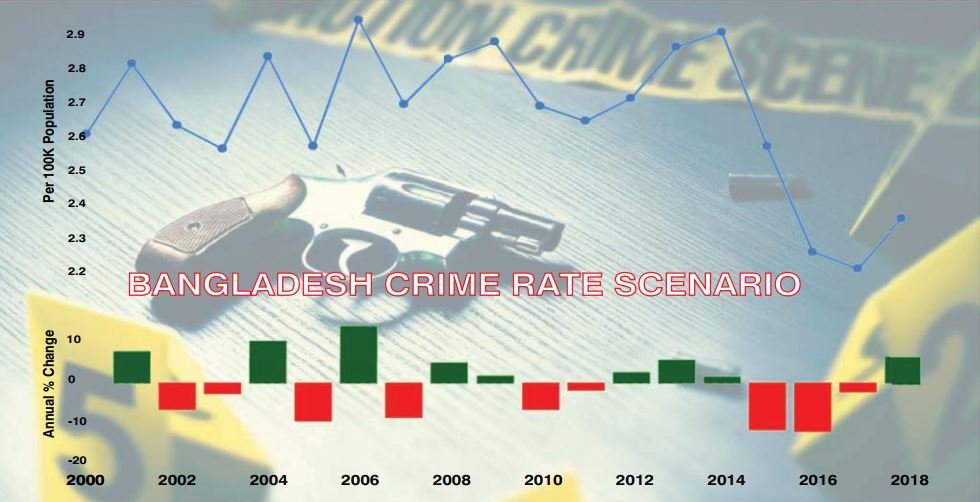
Rohingya Issue
FM Momen thanked the United States for recognising Myanmar military’s violence against Roingyas as genocide and urged them to work with the ASEAN and QUAD members to resolve the crisis. “US should do more for a sustainable solution to the Rohingya crisis take follow up measures,” he told Antony Blinken.
On the other hand, Blinken commended Bangladesh for hosting nearly one million displaced Rohingyas and announced that US will continue to offer support. Secretary Blinken said, “Bangladesh of course is showing extraordinary humanity and generosity in hosting nearly one million Rohingyas who have had to flee persecution in Myanmar. We’re grateful for that, and the work that you’ve done as one of the strongest supporters of UN peacekeeping around the world, and many other things as well.” “We will be working together to help Rohingya who have fled genocide and crimes against humanity committed by the military in Myanmar,” he added. Regarding Bhasan Char, Bangladesh requested the United States to join the humanitarian assistance there.
Later, Momen has requested the US lawmakers to persuade Myanmar in all potential ways to create a safe environment in Rakhine State and take back all the forcibly displaced Myanmar nationals, temporarily staying in Bangladesh, to their homeland. US lawmakers applauded Bangladesh’s kindness in hosting this huge number of Rohingyas and said that they would continue their efforts in this regard.
Boosting Financial Collaboration
Both the countries discussed what they can do together to strengthen the financial partnership as Bangladesh sought broader and expanded cooperation from the US in the investment sector.
Mentioning that it is time to look beyond the energy sector while investing in Bangladesh, Foreign Minister Dr AK Abdul Momen has sought diversified investment from the United States. “Over the last 50 years, Momen said, Bangladesh accomplished a lot of achievements and now we have a vibrant economy, a land of opportunity, and US has been a great partner and friend throughout the development.”
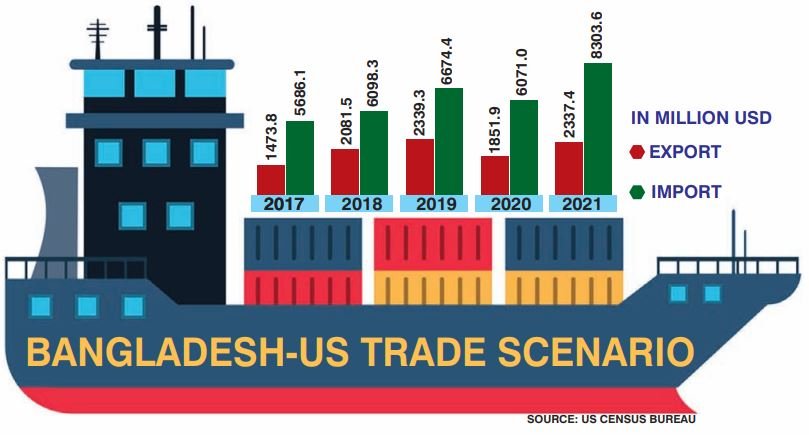
FM said, “Bangladesh is doing very well. But most of the investment from the US has been in the energy sector. Maybe it is time to look beyond that.” Here to mention, United States is Bangladesh’s biggest trading partner with the largest accumulated investment in the country.
US Secretary Blinken and FM Momen also discussed the remarkable economic potential and reflected on the ways they have collaborated over the last 50 years including growing people-to-people ties and vibrant trade exchange.
Bilateral trade between Bangladesh and the US set a new milestone, hitting $10.64 billion in 2021, according to the United States Census Bureau. In addition, Dhaka-Washington bilateral trade was just $720 million in 1990 and it increased to $7.92 billion in 2020. These statistics shows the greater potential that can be achieved by enhancing trade between the two countries.
To further consolidate the economic partnership, the two countries established the ‘Economic Partnership Consultation Mechanism’ which held its first meeting virtually in 2020 and the second one is scheduled to be held on 2nd June 2022. “We heartily believe that our bilateral relations with the US will flourish in the coming days and will certainly contribute to the socio-economic development of the nation,” Momen said.
Bangladesh elaborated its potential in terms of IT sector with around 700,000 young professionals; and also proposed that there may be joint investment proposals in pharmaceutical sectors.
Reinstating GSP
The foreign minister also raised the issue to reinstate the GSP facility for Bangladesh products in entering the US market, which was suspended since 2013.
In reply, Blinken said that US would reinstate the GSP facilities when labour situation to be improved further in Bangladesh. Dr Momen informed that the situation has been improved a lot in terms of labour rights and that is something which needs to be recognised.
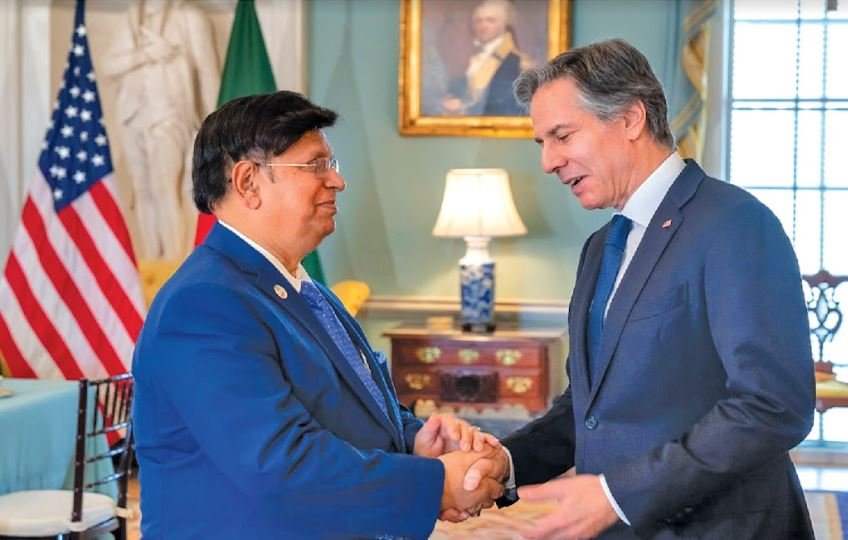
The Bangladesh foreign minister also proposed to make a roadmap with the US to attain the labour issues in international level.
FM Momen briefed the reality of Bangladesh as a small country with high population density and mentioned that the situation is not similar to US regarding the labour rights.
Enhancing Security Cooperation and Indo-Pacific Strategy
Before the formal beginning of the bilateral meeting with US Secretary of State Antony Blinken at the US Department of State, FM said that Dhaka is looking forward to a more enhanced and “rock-solid” connection with United States.
Foreign Minister has explained Bangladesh’s engagements with India and China noting that Bangladesh’s foreign policy, like the US one, is centred on national interests.
As the Biden administration implements its Indo-Pacific strategy, Bangladesh’s relationships with neighbouring India and China suggest that it will draw increasing interest from US policymakers, according to USIP.
Mentioning that India and China have their own problems and Bangladesh does not intervene on those issues, Bangladesh side cleared that it maintains a non-partisan relationship with the neighbours.
Bangladesh and the United States side had constructive discussions on Indo-Pacific Strategy and Bangladesh expressed support towards inclusive socio-economic development in the Indo-Pacific region at the eights Security Dialogue.
General Security of Military Information Agreement (GSOMIA) and Acquisition and Cross Servicing Agreement (ACSA) are essential agreements, which has been signed for enabling a closer defence relationship, expanding opportunities for defence trade, information sharing, and military-to-military cooperation between the two countries.
Later, Bangladesh and the United States have also discussed steps to promote security and prosperity in the Indo-Pacific region in a meeting between US Deputy Secretary of State Wendy Sherman and Foreign Secretary Masud Bin Momen.
Extraditing Rashed Chowdhury
The Bangladesh foreign minister also raised the issue of sending back Rashed Chowdhury, a convicted killer of Father of the Nation Bangabandhu Sheikh Mujibur Rahman, who is now residing in the US.
“American citizens would not like a murderer to be given shelter in the US,” Momen told Blinken. Earlier, he said, there was a process of extraditing Rashed and that should be completed.
In another meeting afterwards, Bangladesh raised the issue of the return of killer Rashed Chowdhury and sought the Senate Majority Leader’s assistance in this regard.
Bangladesh Foreign Minister said extraditing of killer Rashed Chowdhury would be a game changer in the celebration of 50-year ties of the two countries.
Focusing on Fair Elections
Dr Momen briefed US side about Bangladesh’s free and fair election procedure under a transparent and independent election commission. “We have a fair system. We have an Election Commission (EC). The commission is independent and during the election they are the boss,” he told his counterpart Blinken. Momen said free and fair elections are being held at various levels in Bangladesh since Prime Minister Sheikh Hasina came to power.
Here to mention, Bangladesh was in the top third in the US-based voter turnout statistics published in 2019/2020 being ahead of India and Pakistan.
FM Momen informed the fair election process apparently suggesting the United States to encourage Bangladesh Nationalist Party (BNP) to take part in the election process. Mentioning that, the mayor in his city, which is Sylhet, is from BNP and they are very comfortably working together, Momen said, “There is a good election process and system in Bangladesh and all parties except one join the elections that is transparent and fair. If they (BNP) are really committed to democracy they should participate in the election process. They’re welcome if they want to do elections.”
Focusing on other key issues
Both the also highlighted on the ongoing cooperation to address the climate crisis, promote regional security through UN peacekeeping operations. They also discussed on the climate change cooperation, nurturing and facilitating blue economy, combatting pandemic and possible adverse effects of Ukraine crisis in these meetings.
US Secretary Blinken restated the importance of protecting human rights, the rule of law, and freedom of religion. The foreign minister also urged Blinken to take initiative for resuming direct Biman flights on Dhaka-New York-Dhaka route.
Flourishing Dhaka-Washington ties
Bangladesh recognised the warmth of the letter sent to Prime Minister Sheikh Hasina by US President Joe Biden. On the occasion of 50th year of Bangladesh-US diplomatic ties, United States (US) President Joseph R Biden in a letter sent to Prime Minister Sheikh Hasina expressed his confidence to further flourish Washington-Dhaka partnership for next five decades.
“I am confident our partnership will continue to flourish for the next 50 years and beyond,” he said in the letter marking the 50-year milestone in the bilateral relationship between the two countries today. “We are proud of our partnership on development, economic growth and counterterrorism,” Biden said adding that the two countries work together to address the climate crisis, help the Rohingya survivors of genocide and support UN peace keeping worldwide.
“Our defence cooperation is stronger than ever,” the US President said, adding that the Bangladesh Coast Guard and Navy are invaluable partners in ensuring a free and open Indo-Pacific region, contributing to the regional effort to end the trafficking of people and illicit drugs.
Marking the 50th anniversary of Bangladesh-United States diplomatic ties, Ambassador to Bangladesh Peter Hass aptly said Bangladesh can count on the US partnership for decades to come to accomplish the shared goals between the two nations. Haas mentioned that the United States and Bangladesh want the same things – a vibrant, secure, and prosperous democracy, judicial accountability and basic human rights for everyone.

